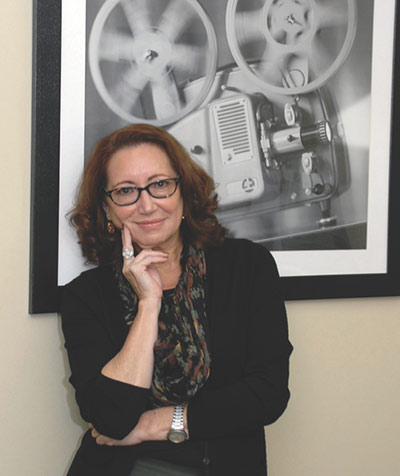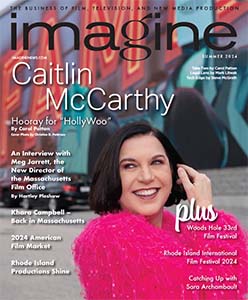By Robert G. Pushkar
When the Screen Actors Guild (SAG) and the American Federation of Television and Radio Artists (AFTRA) merged in March 2012, it became the nation’s largest entertainment union. Previously, two attempts at combining the two unions failed. But by overwhelming votes of members, solidarity prevailed. The union now touts its unified status in its logo: SAG-AFTRA One Union. Actor Ken Howard, who played stalwart local pol Thomas “Tip” O’Neill in Dick Flavin’s “According to Tip” and performed here in 2008, is the first elected president. Howard told members in Los Angeles, “With this historic vote, members of both unions have affirmed one of the most basic principles of unionism: Together we are stronger.” And he added that the merger “brings together the best elements of both unions and positions us well to thrive in the changing 21st-century media landscape.”
SAG-AFTRA’s New England Local has embraced the change with its recently appointed executive director, Susan G. Nelson, who took over the helm in March 2013. She succeeded long-time director Dona Sommers who led the local for nineteen years. During the transition Sommers remained on board as a consultant until her official retirement on October 4th.
Nelson was the top choice after a search by the National’s Human Resources Department and the local’s committee narrowed the field of applicants to three candidates. An attorney with extensive background in labor and employment law, risk management, human resources, and program development in nonprofit administration, she recently served as counsel to the Connecticut State Employees’ Association. Her resume includes experience and skills with collective bargaining and labor relations which positions her to interpret, negotiate, and enforce contracts on behalf of members.
“I’m the first Local executive director hired nationally since the merger. Others came from legacy SAG or legacy AFTRA, two very differently run organizations,” she said in a recent interview in her office in Park Plaza. “Many people have only that frame of reference. I think my perspectives are useful because I know more than one way.”
She describes herself as an “artsy person” which is one reason why she was attracted to the entertainment industry. In college she aspired to be a playwright, yet later upon graduation, she switched to human resources where she worked in labor-related areas. She graduated from the University of Connecticut School of Law with a Juris Doctor degree.
One of her strengths, she believes, is employment relationships, and her focus is on compromise. “My orientation is so far from the traditional labor movement,” she said, “because I have always been about collaboration. I am not about adversarial relationships unless it has to go there. My whole approach is: ‘let’s see if we can figure it out so that it works for everybody’.”
For the last eight months Nelson has been getting up to speed educating herself about the entertainment industry and “getting a handle on how this industry operates and what are the relationships between the various stakeholders and their constituents.”

Staff and delegates at the recent SAG-AFTRA inaugural convention in Los Angeles in September. From L-R (standing) Susan Nelson*, Vic Ramos, Bill Mootos, Ellen Colton, Frank Cacciola, Andrea Lyman, Tom Kemp, Michele Proude, Don Warnock, Tom Higgins*, Benjamin Winthrop*. L-R (seated) Paul Horn, Peter McSwiggin, Jessica Maher*. * denotes SAG-AFTRA staff. Photo by Angela Weiss/SAG-AFTRA
Merging two huge organizations, Nelson believes, “will continue to take time to gel.” Everything was still settling when she came on board. Nationally SAG represented more than 125,000 principal and background actors in 20 branches while AFTRA represented 70,000 performers in 32 local across the country. The New England local has about 3,000 members in Massachusetts, Maine, New Hampshire, Vermont, Rhode Island, and half of Connecticut.
“Merging of two huge systems together on the national level is a very slow process. You try to access what’s out there and try to standardize in some reasonable way what works for everybody. It presents a set of frustrations but it’s also a great opportunity. It’s a challenge to get members to understand there is no SAG, and there is no AFTRA. It’s a brand new entity.”
High on Nelson’s priority list is to ensure that the state tax incentives to the industry remain intact. “We play close attention to what is going on in the State House. We don’t want to see it capped. It brings a lot of revenue to the state. We must keep informing legislators that this is a huge employment booster.”
Also, she wants to reach out to producers, especially in the how-to corporate videos and non- broadcast videos. “One of our goals is to make it easier for producers to work with union talent because our members want the work, but they can’t accept a job under a non–union contract. I’d like to interview producers to find out what their experiences have been working with the union and to see what problems if any arose, so I can work with them to make it better.”
Nelson’s other goals are to focus on member education and production community education about the union. “There are many misconceptions. For example, we are not a ‘hiring hall.’ It’s not the union’s job to get members work. It is our job to negotiate and enforce their conditions of employment and provide resources to help further their careers.
“I want to identify the gaps and try to break down the obstacles to provide excellent services to our constituents locally. I want to be a good liaison between our local and the national union as it continues the process of developing policies for all of the locals. We have a certain degree of local autonomy but not as much as the former legacy AFTRA did. I have to make sure that our needs are understood by the national office.
“This is such an exciting time in New England for our members. We are seeing more and more great work coming to the region because we can provide everything they need right here. It makes it possible to have a thriving creative community.”
Writer-photographer Robert G. Pushkar writes and photographs for IMAGINE and for many national, regional, and local publications. He is marketing two award-winning screenplays and a theater stage play. He may be reached at [email protected].





